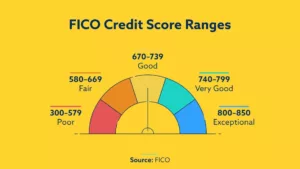You’ve been working diligently to improve your credit scores. After a few months of paying down balances, removing derogatory items like collection accounts or charge-offs your score increase is miniscule.
Even worse, your credit scores start to decrease when derogatory accounts are removed. Well, welcome to the confusing world of credit scoring.
Just know you are not fighting a losing battle. Don’t give up. It’s not you, it’s FICO. FICO groups consumers with similar credit histories together in Scorecard Buckets. These buckets can be responsible for your credit score not improving and here is why:
You’ve been Rebucketed. What you say is Rebucket? First, no one except the people over at FICO know what exactly determines your credit score. There are numerous variables such as length of credit history, age of accounts, number of derogatory items present, how many accounts in good standing, payment history, accounts with balances and so on and so on that go into a score.
When calculating credit scores FICO groups consumers in different buckets known as Scorecards. What this means is your credit profile is compared to other consumers with a similar credit profile to determine your credit score. You may have been at the top of one scorecard with a collection account on your credit report but once the collection account is deleted, you may fall to the bottom of a different; but higher, scorecard bucket.
The good news is this type of credit score decrease may only be temporary. As long as you keep up good credit management like making timely payments and keeping credit card balances low, your credit score will improve with time.
Another way to look at it. Let’s say you have a fair credit score of 660 with one old collection account, 5 accounts with no late payments and 3 older accounts with several late payments. You are able to negotiate a pay for deletion of a collection account but once the collection account is removed, your score decreases or you only gain a few points. What’s up with that? Well, you’ve been rebucketed (grouped with consumers in another scorecard).
But don’t fret, this is a good thing because now you are with a group of people with no collection accounts. There may be consumers in this group that have older late payments than yours so even though you’re in a different bucket, you are now at the lower end of that higher scorecard bucket. Thus, your score may have only increased a few points with the removal of a collection account, or, it may have decreased several points. Again, don’t worry, it is temporary as long as you stay on track.
Consumers in this scorecard group may be constantly changing as information changes in their credit profiles. This means as newcomers enter the scorecard bucket you are currently in, your credit score will improve.
Overlapping Scorecard Buckets. The scorecard buckets go from one level to the next but in some instances may overlap plus or minus by 30 points. So even if you move to the next bucket you may remain at the same credit score if you are rebucketed into a higher scorecard level. Each bucket has its own minimum and maximum score that can be achieved while in that bucket.
Consumers with major derogatory items like bankruptcy, tax lien, collection account or charge-offs are in the bottom buckets. Their credit score can only go so high for as long as they are stuck in the bottom buckets. Only after the major derogatory is deleted can they move up to the next bucket. But that does not mean you get a higher credit score because you are now being compared to consumers with better credit profiles.
You may go from being at the top of your credit score in a lower bucket to being at the bottom of your credit score but in a higher bucket. That’s why some consumers’ scores will drop when they get rebucketed – you are now being compared to other consumers who have been in a higher bucket for years that have excellent credit. Consumers with high credit scores often have a good mix of credit including revolving credit, installment loans like a mortgage loan, very low utilization of credit cards and a long credit history.
If you want to torture yourself you can read more about FICO Scorecards Models here.
Other Major Derogatory Items. One collection account may have been deleted but until your credit profile has no major derogs, you may remain in a “dirty scoring bucket.” This means any score improvements in this bucket are not as significant when only one major derogatory like a collection account is deleted and other major derogs remain on your credit profile.
Time is your friend. As your accounts with late payments get older and your accounts in good standing (no late payments) get older, you’ll experience an increase in credit scores. It may take several months but your scores will improve as long as no new negative information is added to your reports.
All late payments drop off. Once all negative information drops off and your credit utilization is good (10 percent or less of your available credit), BANG! You are now in the 700s.
Average age of accounts. Now that you have aged positive accounts (5 to 6 year) and no more late payments along with low utilization…BOOM! You have now been Rebucketed with the consumers who have excellent credit in the high 700s to low 800s.
Patience is Key. With multiple collections and late payments you won’t be able to make it to the next scorecard of consumers. But as the derogatory information is removed you’ll be moved to higher scorecards. Sometimes there may be overlapping in buckets meaning two buckets (scorecards) share some of the same scores which explains why you may actually get a lower credit score once you enter a higher bucket (scorecard).
But don’t despair because you need to be in that higher bucket to move onto to the next level bucket (scorecard).
Stay on track with rebuilding. Removing derogatory information is worth it even if you do not see a huge score increase. It means you are in a new scorecard bucket which inevitably ensures that you will get that higher score in time. Just stay on track with doing the right things.











